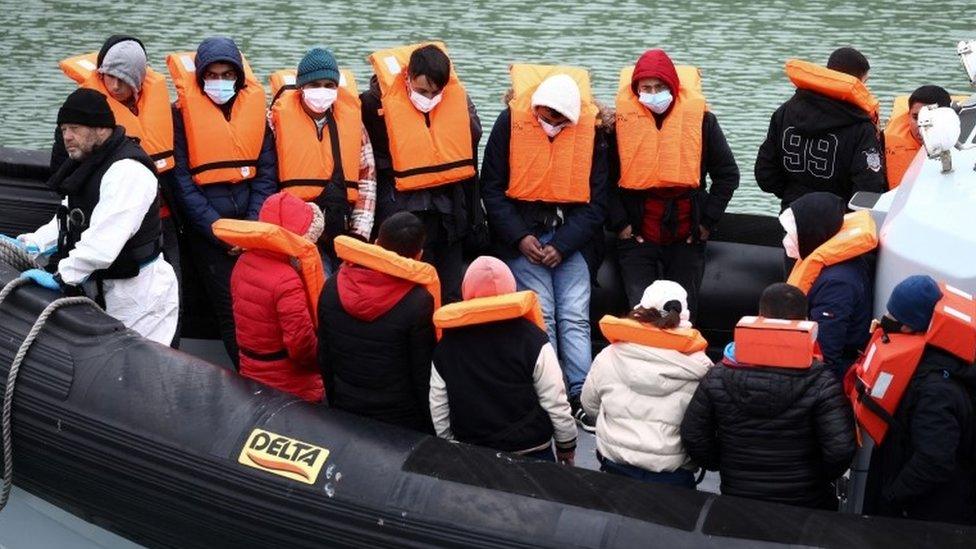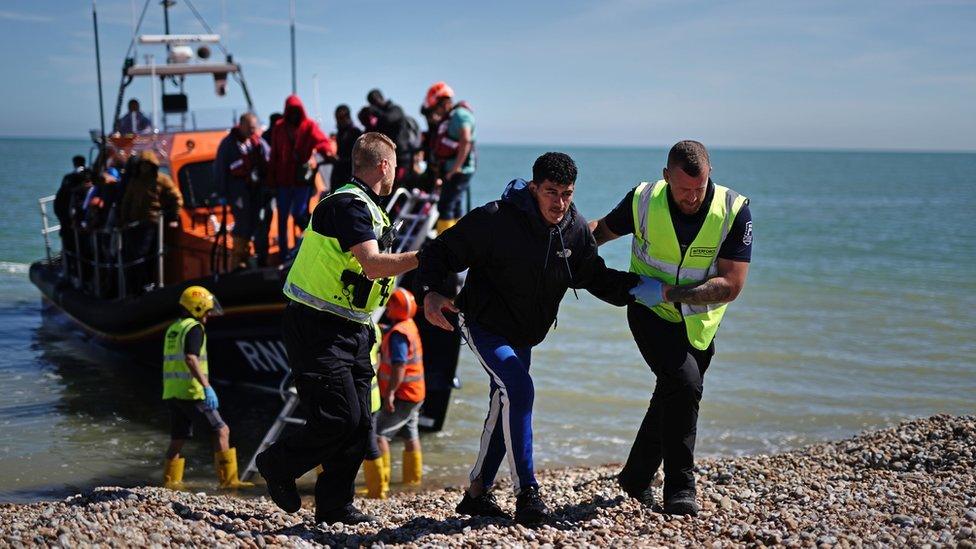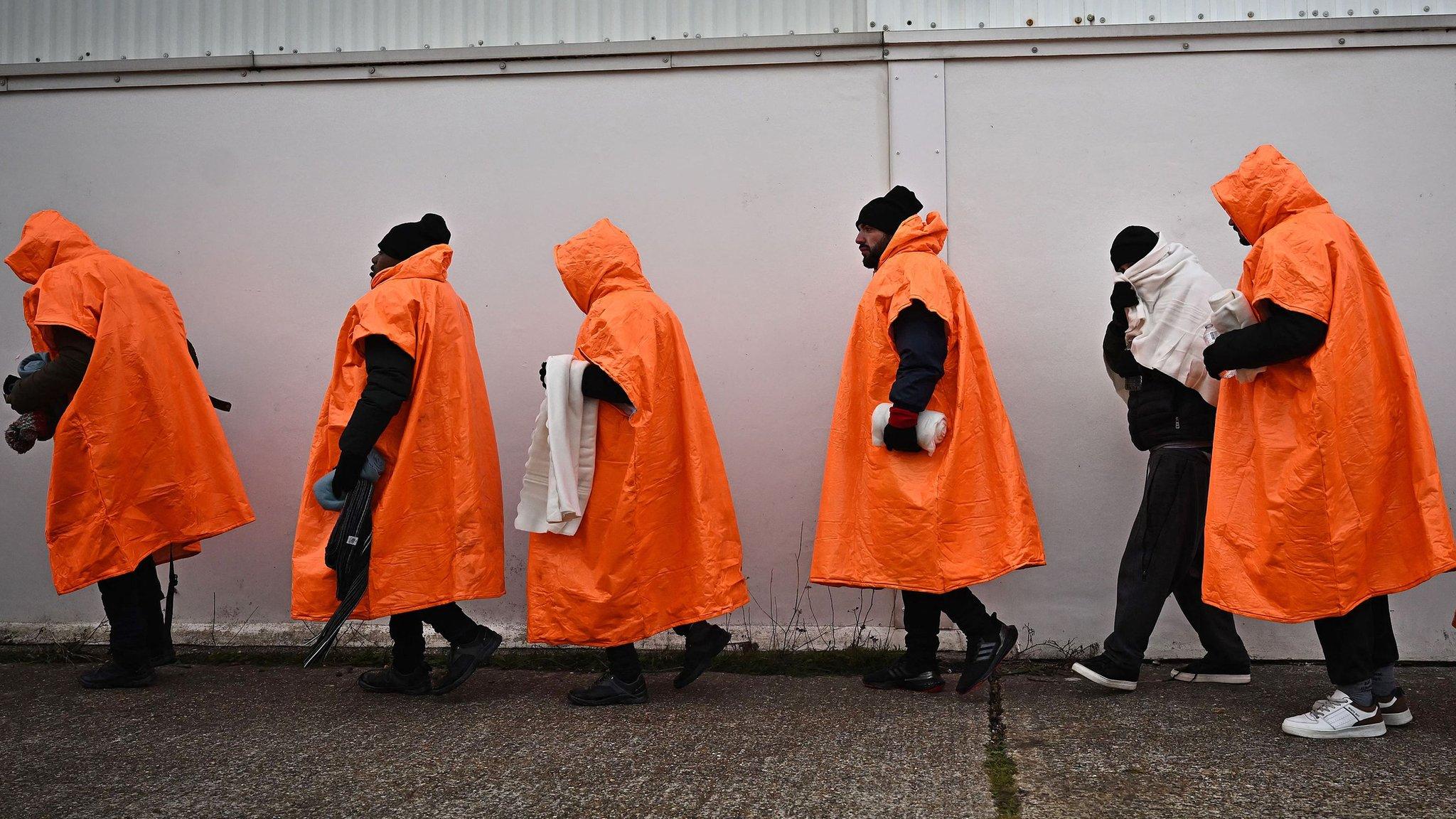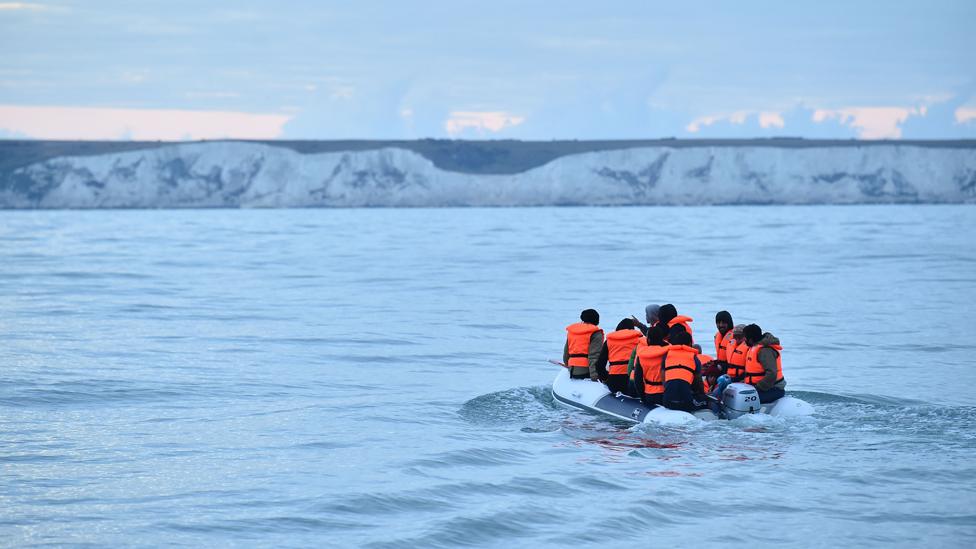Labour seeks new deal with Europe to stop small boats gangs
- Published

Sir Keir Starmer is seeking a deal with Europol for a future Labour government, to try to stop gangs bringing people across the channel in small boats.
The Labour leader - who is in the Hague for talks with the EU agency - said smashing the gangs should be treated "on a par" with terrorism.
Any migrant returns deal may require the UK accepting migrants from the EU.
The government claims a returns policy could lead to the UK taking "100,000 illegal migrants" every year.
Home Secretary Suella Braverman wrote on X, formerly known on Twitter, that Sir Keir would "agree to make Britain the dumping ground for many of the millions of illegal migrants that Europe doesn't want".
Sir Keir said it was "embarrassing the government is pumping out this nonsense" and that his discussions were focused on sharing information on people smuggling gangs to "stop boats getting in the water in the first place".
"It ought to be the UK government who decides who comes to the UK," Sir Keir said.
"But at the moment, because the government has lost control, it is those that are running the gangs that are putting people in boats to cross the channel.
"That's why I'm here at Europol saying how can we have a better agreement to share intelligence have joint operations to take these gangs down."
He also said that a Labour government would end the use of hotels for asylum seekers within 12 months of coming to office.
In a bid to clear the backlog of asylum cases, Labour has said it would recruit an additional 1,000 Home Office caseworkers, establish new asylum courts to speed up legal challenges and create a returns unit to accelerate the removal of failed asylum seekers.
Sir Keir told the BBC that "everybody accepts" the need for a new EU-wide returns agreement.
The Labour leader has suggested he may be willing to accept a quota of migrants in the UK in exchange for a deal. When pressed by reporters on Thursday morning, Sir Keir would not give a number of asylum seekers he would be happy to take in under a deal.
Labour are "not in a position to negotiate that, and that's not what I've been talking about today", he added.
Immigration Minister Robert Jenrick said a returns agreement based on proposed EU migration rules would mean "Britain will be forced to take more than 100,000 illegal migrants from the safety of Europe each year, disregarding the will of the British people to cut numbers and stop the boats".
Mr Jenrick said: "Sir Keir is utterly unprepared to take the tough but necessary decisions to stop the boats, taking the easy way out which will not fix the problem. For all their political stunts, Labour remains the party of unlimited and uncontrolled immigration."
The 100,000 figure is based on proposed EU rules setting migrant quotas for member states based on population size and economic strength.
But Sir Keir said negotiations would not be bound by these rules since "we are not a member of the EU".
Downing Street said accepting a quota of migrants from the EU was a red line in its ongoing negotiations for a returns agreement. The prime minister's spokesperson did not dismiss giving more money to the EU for a deal.
Sir Keir Starmer says the UK should make its own deal with the EU to send migrants back to their home countries.
Sir Keir denied that negotiating for closer co-operation with the EU was a weakening of his stance on Brexit, but said it was needed.
Prime Minister Rishi Sunak says "stopping the boats" is a key priority and passed a law earlier this year with that in mind., external
In total, 45,755 migrants crossed the Channel in 2022, the highest number since figures began to be collected in 2018. So far this year, 23,382 people have made the crossing, according to the latest figures.
The Labour leader hopes a Europol deal will include a replacement for the EU's live police data and intelligence-sharing system.
Labour has already committed to abandon government plans to remove asylum seekers to Rwanda, and instead invest in more resources for the National Crime Agency, which carries out operations against traffickers.
Labour's plans "wouldn't even stop the boats", Mr Jenrick has argued.
"The experience with Albania is you have to have a strong deterrent - that means you need a policy like our Rwanda plans," he said.
Last year Albanians accounted for more than a quarter of the migrants who reached the UK in small boats. The number has fallen more than 90% since the government signed a returns deal with Albania in December.
Post-Brexit
Brexit saw the end of the UK's seat on the board of Europol, and access to shared intelligence databases.
The agreement between the EU and the UK replaced some of the previous arrangements, including a new surrender agreement so that serious criminals can be moved between the two territories.
There was also a new agreement on the exchange of criminal record information, fingerprints, and number plate data.
But senior police have raised concerns that the EU's criminal database - the Schengen Information System (SIS II) - was a faster way of sharing police information than its post-Brexit replacement, known as I-24/7.
The government has committed to improving other shared databases in the coming years.
Related topics
- Published3 September 2023

- Published13 December 2023

